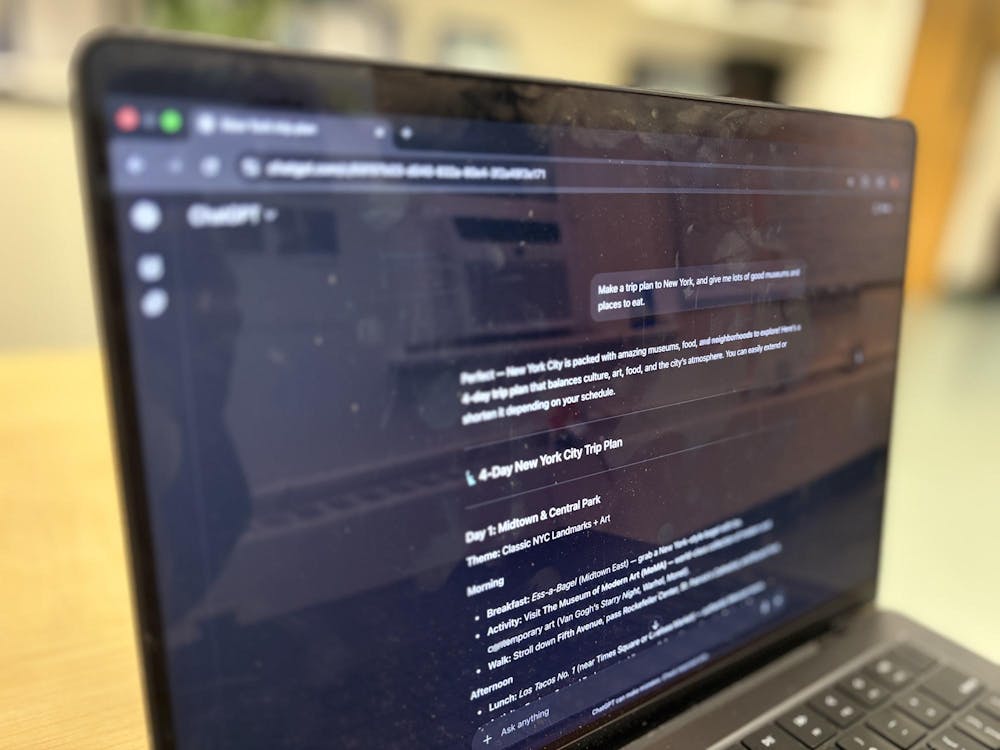Following the release of The Daily Princetonian’s sixth annual Frosh Survey, Data writers and editors analyze and compare the data with other surveys, including past Frosh Surveys and Senior Surveys. See our previous ‘Dlog’ on first-years and their pre-college employment status here.
Nearly half of the members of Princeton’s Class of 2029 used some form of artificial intelligence (AI) on their college essays, and 88 percent of students reported using AI in some capacity in general. On one hand, Princeton has embraced AI and launched initiatives to advance research and development in the field. On the other hand, the University has expressed caution, emphasizing careful use of generative AI within the honor code and warning against its use in applicants’ essays. The Class of 2029 Frosh Survey reveals a growing gap between the University’s expectations and student behavior as AI becomes an increasingly universal part of academic life.
Despite the recent popularity of AI tools, sentiment towards them among the Class of 2029 is mixed, where some seem to embrace AI, while others remain cautious about its implications.
The Class of 2029’s view of AI is mixed, with about 40 percent indicating that AI is useful in certain cases and roughly 20 percent indicating that it is dangerous, regardless of major. Among those intending to major in the humanities, 48.7 percent of respondents indicated that AI is dangerous. Meanwhile, only 21.7 percent of engineering students report feeling that AI is dangerous. Instead, they indicated believing AI is either useful or revolutionary, with 73.1 percent of engineering respondents indicating either one of the two.
The use of AI for writing is prevalent among members of the Class of 2029. Unlike some schools, Princeton does not outright prohibit the use of AI on admissions essays. However, the admissions office does strongly discourage it. Among survey respondents, 47.7 percent indicated the use of at least one AI tool on college essays.
Of the students who indicated using an AI tool for writing, Grammarly Free was the most popular tool used for college essays, with 47.4 percent of students using it. Meanwhile, 15.8 percent of this group indicated the use of either free or paid ChatGPT on college essays, and 29 percent indicated the use of two or more tools.

The Office of the Dean for Research does provide certain tools for research and writing; however, these tools do not include Grammarly or ChatGPT, instead only providing Microsoft Copilot Chat to students. Other tools such as Github Copilot and Zoom AI are in the process of being evaluated.
Princeton takes academic honesty seriously and upholds it through its Honor System, emphasizing not only individual honesty but also accountability for reporting misconduct.
Most incoming students claimed to not have cheated in high school, with 19 percent doing so and 15.4 percent reporting the use of AI as part of it. 65.5 percent of students said they knew a peer who cheated but did not report them, while only 6.4 percent chose to follow through with a report. These responses contradict the Honor Code’s core emphasis on students reporting suspected violations alongside the expectation of upholding one’s own academic honesty.

Of the Class of 2029 survey respondents, 12 percent indicated that they have never used AI. The remaining students have used AI for a wide range of purposes.
While 25.8 percent of humanities majors indicated never using AI, only six percent of engineering majors indicated the same. Engineering students, in particular, use AI for coding more often than other majors, with 38.7 percent having done so. Overall, the most common use for AI is recreational, with at least 59 percent of students across all majors reporting using it for things such as making recipes or planning trips. Engineering students also reported high use of AI for academic applications, with 53.2 percent using it for STEM problem solving assistance. Still, social science students had the highest proportion of AI use for administrative tasks. For instance, over half of them used it to read and write emails, schoolwork, and cover letters.
AI use is more prevalent among prospective engineering majors in the Class of 2029, while humanities majors tend to be more wary of the technology. Yet, it is clear that AI has already become inseparable from academic life, regardless of the discipline. For Princeton’s first-year class, AI represents both the potential for great efficiency and the challenge of maintaining academic integrity.
Aayush Mitra is a contributing Data writer for the ‘Prince.’
Please send any corrections to corrections[at]dailyprincetonian.com








